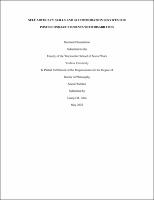Please use this identifier to cite or link to this item:
https://hdl.handle.net/20.500.12202/8235| Title: | Self Advocacy Skills And Accommodation Services For Postsecondary Students With Disabilities |
| Authors: | Krase, Kathryn Lane, Shannon Rosenberg, Joan Attis, Latoya M. |
| Keywords: | social work academic accommodations equity postsecondary disability policy self-advocacy students with disabilities transition to postsecondary education |
| Issue Date: | May-2022 |
| Publisher: | ProQuest Dissertations & Theses Global |
| Citation: | Attis, L.M. (2022, May). Self Advocacy Skills And Accommodation Services For Postsecondary Students With Disabilities. (Publication No. 29215929) [Doctoral dissertation, Yeshiva University]. PDTG |
| Series/Report no.: | ProQuest Dissertations & Theses Global;Publication No. 29215929 |
| Abstract: | The current iteration of United States federal disability law for postsecondary students with disabilities is implemented in ways that requires students to develop the ability to discuss their disabilities and assert their rights if they want to receive educational accommodations to support their academic success. Examining the implementation of these policies from an ecological systems and sociopolitical lens suggests that this approach assumes students with disabilities have developed self-advocacy skills during their formative years, and also places others in control of determining whether they receive educational accommodations and services, that by law they have rights to receive. Self-advocacy is a critical skill for effective communication, negotiation, and for individual assertion of needs, rights, and is linked to successful transition, persistence, and retention in college and academic performance. Because caregivers and teachers often advocate on behalf of students with disabilities in secondary education, students with disabilities may not have independently acquired the self-advocacy skills they need in postsecondary education. This cross-sectional study (n=103) explored the factors that affect the self-advocacy skills of self-identified postsecondary students with disabilities and the ways students approach accommodations and support services at six postsecondary institutions within the United States. Data was analyzed for significant relationships through Spearman’s rank-order correlation. Findings revealed the following five factors were related to the ability of students with disabilities to self-advocate: ability to identify disability and its characteristics; knowledge of institutional accommodation policies, services, and disability law; self-determination; prior history of witnessing advocacy; and positive interactions with disability staff. The implications of the study will then be examined with an emphasis on future research, social work education, practice, and policy changes. |
| Description: | Doctoral dissertation, PhD / Open Access |
| URI: | https://hdl.handle.net/20.500.12202/8235 https://ezproxy.yu.edu/login?url=https://www.proquest.com/dissertations-theses/self-advocacy-skills-accommodation-services/docview/2676616143/se-2?accountid=15178 |
| Appears in Collections: | Wurzweiler School of Social Work: Dissertations |
Files in This Item:
| File | Description | Size | Format | |
|---|---|---|---|---|
| Latoya M. Attis May 2022 OA Self advocacy skills.pdf | 1.01 MB | Adobe PDF |  View/Open |
This item is licensed under a Creative Commons License

